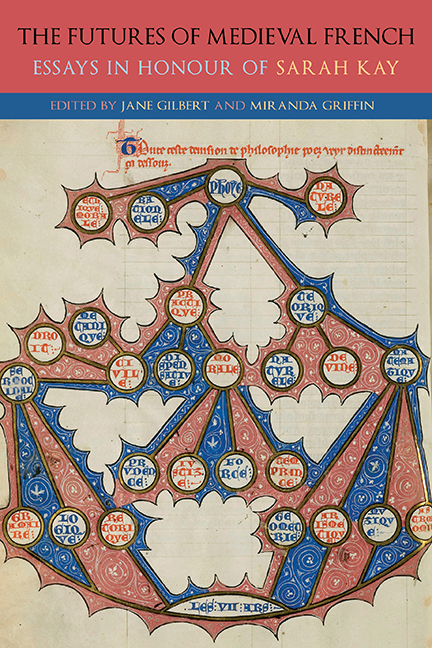Book contents
- Frontmatter
- Dedication
- Contents
- List of Illustrations
- List of Contributors
- List of Abbreviations
- Introduction
- Part I Subjectivity in Troubadour Poetry
- Part II The ‘Chansons de geste’ in the Age of Romance: Political Fictions
- Part III Courtly Contradictions: The Emergence of the Literary Object in the Twelfth Century
- Part IV The Place of Thought: The Complexity of One in French Didactic Literature
- Part V Parrots and Nightingales: Troubadour Quotations and the Development of European Poetry
- Part VI Animal Skins and the Reading Self in Medieval Latin and French Bestiaries
- Afterword
- General Bibliography
- List of Manuscripts
- Bibliography of Work by Sarah Kay
- Index
- Gallica
Introduction
Published online by Cambridge University Press: 27 May 2021
- Frontmatter
- Dedication
- Contents
- List of Illustrations
- List of Contributors
- List of Abbreviations
- Introduction
- Part I Subjectivity in Troubadour Poetry
- Part II The ‘Chansons de geste’ in the Age of Romance: Political Fictions
- Part III Courtly Contradictions: The Emergence of the Literary Object in the Twelfth Century
- Part IV The Place of Thought: The Complexity of One in French Didactic Literature
- Part V Parrots and Nightingales: Troubadour Quotations and the Development of European Poetry
- Part VI Animal Skins and the Reading Self in Medieval Latin and French Bestiaries
- Afterword
- General Bibliography
- List of Manuscripts
- Bibliography of Work by Sarah Kay
- Index
- Gallica
Summary
READING POLITICAL FICTIONs today, I am struck by how many of its arguments and ideas remain ground breaking. Some, it is true, have been absorbed into the critical mainstream. The chansons de geste are no longer viewed as vestigial, ‘popular’ survivals of primitive oral traditions that were superseded during the twelfth century by the sophisticated romance genre, but as self-conscious artworks and serious political theorising in a rich tradition that continues throughout the medieval period. Even before Kay brought to bear her characteristic blend of psychoanalysis and Marxism, building here especially on Fredric Jameson (1981) and on Mikhail Bakhtin (1981) to argue that chanson de geste and romance reveal each other's ‘political unconscious’, critics who worked extensively with chansons de geste knew that they entertain dialectical relationships with other genres and discourses and that their engagement with Islam, women, and alterity is multifaceted and complex; Kay drew notably on such scholarship in German and, to a lesser degree, in French. Nevertheless, the image of the ‘monologic’ song, always and only an epic celebration of white, Christian, western European, elite male warriors baying for the mass slaughter of dehumanised, homogenised ‘pagans’ – principally European and North African Muslims – continues to meet modern needs. Even a little research into the field shows that this stock summary of chanson de geste politics and poetics was long ago discredited by critical assessments that in the best cases manage to be nuanced and informed without being apologetic.
Some of the key ideas in Political Fictions, however, have been neither assimilated nor debated, including Kay's original thesis of the ‘poetics of the gift’. Drawing on feminist social anthropologist Marilyn Strathern's magisterial The Gender of the Gift (1988) and on the example of R. Howard Bloch's Etymologies and Genealogies: A Literary Anthropology of the French Middle Ages (1983), Kay develops the anthropological distinction between ‘commodity’ and ‘gift’ economies into large cultural paradigms that bear on both Old French literature and its modern reception.
Kay argues that critics today find medieval romances appealing because they adopt a ‘commodity’ poetics familiar to us: a single, ‘individual’, almost always masculine viewpoint negotiates a world of opaque ‘objects’ – things, words, and people – and worries about the adequacy of such objects to mediate between that viewpoint/individual and the world.
- Type
- Chapter
- Information
- The Futures of Medieval FrenchEssays in Honour of Sarah Kay, pp. 67 - 70Publisher: Boydell & BrewerPrint publication year: 2021

